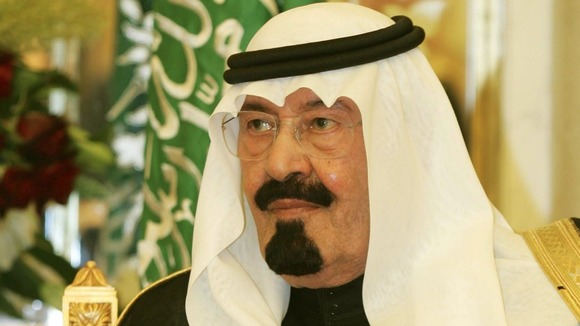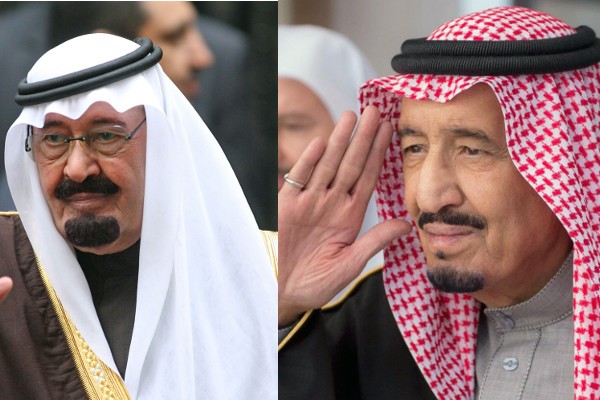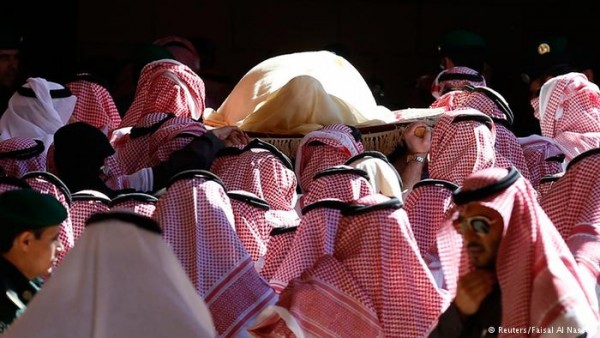
By: VOA News
Source: VOA News
New Saudi King Salman is pledging to continue the policies of his half brother, the late King Abdullah, who was buried Friday in the capital, Riyadh.
Abdullah, who died early Friday after a long illness, was laid to rest in an unmarked grave following a simple ceremony attended by the Arab and Muslim world’s top leaders. One of the world’s few absolute monarchs, he was believed to have been 90 and recently had been hospitalized with a lung infection.

The oil-rich, Sunni-ruled kingdom moved quickly to ensure a smooth transition by appointing a new monarch.
The new king, thought to be 79, has been crown prince and defense minister since 2012. Another half brother, Muqrin, was named the new crown prince. Salman named his nephew, Mohammed bin Nayef, as the new deputy crown prince and his son, Mohammed bin Salman, as Saudi Arabia’s new defense minister and head of the royal court. Salman also said he would keep most other ministers.

In a televised speech, Salman vowed to “continue adhering to the correct policies” of his predecessors. “We will remain, God willing, holding the straight course that this country has walked on since its establishment by the late King Abdulaziz,” he said.
The new king led prayers at a funeral service for Abdullah at the Imam Turki Bin Abdullah Grand Mosque in Riyadh. The late king was buried in a simple white shroud, according to Muslim tradition, in an unmarked grave at Al Oud public cemetery.
Tributes and criticisms
Among world leaders offering condolences, U.S. President Barack Obama offered the sympathies of the American people to the Saudi people and royal family. Obama said the king always was candid and had the courage of his convictions, including using the U.S.-Saudi relationship as a force for security and stability.
U.S. Vice President Joe Biden’s official Twitter account announced Friday that he would lead a delegation to Saudi Arabia to pay respects to the king’s family and country.
Other reactions to Abdullah’s passing were less laudatory.
Human Rights Watch said in a statement that Abdullah’s reign “brought about marginal advances for women but failed to secure the fundamental rights of Saudi citizens to free expression, association, and assembly.”
The rights group urged his successor, Salman, to “halt persecution of peaceful dissidents and religious minorities, end pervasive discrimination against women, and ensure greater protections for migrant workers.”
Meanwhile, Islamic militants and their supporters celebrated the king’s passing.
“He sent his warplanes to kill Muslims in [Syria]. He imprisoned Muslim men and women and wherever there was a war against jihadis, he was the first,” a jihadi supporter named Abu Azzam al-Najdi railed on social media, Reuters reported.
Twitter posters used hashtags that, translated from Arabic, mean “Death of a Tyrant,” the news agency said.
Abdullah ushered in modern era
King Abdullah officially ascended to the throne in 2005. But he actually had ruled since 1995, when his predecessor and half brother, King Faud, suffered an incapacitating stroke.
Abdullah is believed to have been born in Riyadh in 1924 to an ultra-conservative family in which the traditions and hospitality of Islam were always stressed.
As he grew into adulthood, oil was discovered in the Saudi desert and the country grew into the world’s top oil exporter, bringing vast wealth to royal family.
Upon taking control, Abdullah began unprecedented moves to modernize the conservative kingdom.
Women were given a voice in politics. This year, for the first time, they’ll be allowed to vote in local elections.
Abdullah also established a Western-style university where students from both sexes openly mixed and shared classes.
Previously banned music could be heard on Saudi television and radio.
Foreign policy maverick
Abdullah was something of a maverick in his foreign policy. He proposed a peace deal in which Arab League states would recognize Israel if the Palestinians get their own state.
In a leaked U.S. diplomatic note, the king urged the U.S. military to attack Iran and “cut off the head of the snake” to stop it from building a nuclear weapon.
Saudi Arabia is one of the top suppliers of arms to the rebels fighting to overthrow the Syrian government. It is a leading member of the U.S.-led coalition fighting against Islamic State in Iraq and Syria.
Saudi Arabia is part of the G20 economic bloc and the World Trade Organization.
Despite reforms at home and moderation abroad, human rights groups continue to assail Saudi Arabia. They say women are still denied many basic rights.
The king refused to support the Arab Spring movements that toppled dictatorships in Tunisia, Egypt, Libya and Yemen.
Dissent is not tolerated, free speech is muffled, and criminals still face extreme punishment such as beheadings.
Some information for this report was contributed by Reuters.



